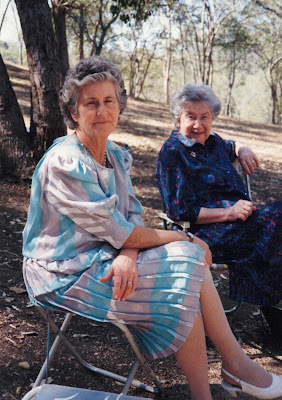In the beginning...52 Ancestors in 52 Weeks - Week 1
Amy Johnson Crow offers the following prompt for bloggers who are participating in 52 Ancestors in 52 Weeks.
This week’s theme is “In the Beginning.” (According to “The Sound of Music,” the beginning is a very good place to start.) Who was the first person you wanted to find when you started your genealogy journey? Was there a family member who sparked your interest, maybe by giving you a bunch of genealogy “stuff”? This would be a great week to write about them!
Some people think family history is my life. Perhaps they're not far off the mark. Although bridge, my grandson, reading, sewing and spending time with dear friends compete heavily for my attention too. This week's prompt has made me think about who was there at the beginning of my family history journey?
Three women were very supportive of my early efforts in family history research - my mother, my mother-in-law and her sister-in-law.

Barbara, Isabel, Alex and Caspar
I became aware of family history in my teens. My mother's mother and her twin sister were placed in an orphanage as a baby with their older siblings and my mother was keen to find out about her grandfather and the situation that led to that event. I was put to work on a microfilm reader in the state library of NSW looking for a newspaper article on Walter William Forfar her grandfather. You can see it here on this blog post and read more about Walter here. The Forfars continue to be an endless source of interest to me in terms of family history research. When I moved to Brisbane in the early 1980s, my mother asked me to help research the other side of her family - the McLoughlins who arrived in Brisbane in approximately 1864. See this blog post for more details.

Fay and Alice at my daughter's christening picnic
My mother-in-law Fay and my husband's aunt Alice, were a bit like my patrons really when it came to researching my husband's family history before we were even married. We would go thirds in whatever my digging cost and I felt very fortunate that they were as interested in family history as me.
Fay and Alice were keen to find out as much as I could find about Alice's grandfather and great-grandfather and it ended up being quite a journey. I have blogged about Robert James Daw and his father Thomas Daw on this blog There's still a mystery about Robert James Daw which we haven't solved i.e. what happened to him? We have no record of his death and I wonder if we ever will.
However, those of you who have been researching family history for a long time will know that researching female ancestors and drawing a picture of their lives can be problematic for all sorts of reasons. Female ancestors often change their names when they marry. They may not have such a public profile as the men in their lives. They may not intersect with the law or government as often as the men in their lives. Their lives are often hidden despite being busy, demanding and interesting.
Barbara, Fay and Alice are no longer with us and are much missed. I have many photos of them with their grandchildren/nieces and nephews and the joy on their faces is a delight to behold. Barbara left me her letters and family photos which provide a wonderful insight into her life. Women are often the custodians of family history but don't tend to have a high profile when it comes to recording their lives.
It's not my place to write up a biography of Fay's and Alice's lives as there are others who knew them more closely and for longer. However I am conscious that family history can vanish very quickly - sometimes just in one generation - as happened for Alice and her father and my mother and her mother. I will write up some notes on Barbara, Alice and Fay for my descendants so they have an idea of how important these women were in our lives and what a strong role they played.
I urge you to record the story of your closest female ancestors' lives as much as you can. You may be the last to have really known them or have heard stories about their lives. If you don't want to make the stories public, that is absolutely fine. Just record what you can and make sure your descendants (or the ones who are interested in family history) know where you keep those stories and will preserve them for future generations.
“What is born will die, What has been gathered will be dispersed, What has been accumulated will be exhausted, What has been built up will collapse, And what has been high will be brought low.”
― Sogyal Rinpoche, The Tibetan Book of Living and Dying
Our ancestors may die, but we can help them live on by preserving their stories today.


Comments